 Who is the blogger?
Who is the blogger?
To see a simple English version of reviews about some of the movies, click on the ESL section of Midnight Oil.
Entries in drama (34)
Compulsion (1959)
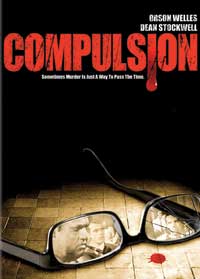 Compulsion (1959) is an interesting twist on the infamous thrill killing "Crime of the Century" committed by Leopold and Loebin the 1920s.
Compulsion (1959) is an interesting twist on the infamous thrill killing "Crime of the Century" committed by Leopold and Loebin the 1920s. 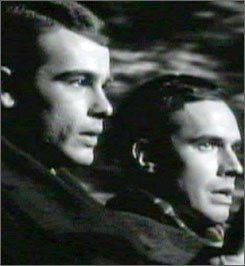 Historically, the case had influence in America in ending the death penalty for murder. Dean Stockwell and Bradford Dillman play the rich young degenerates who engage in the most shocking of crimes. Orson Welles plays Clarence Darrow, the defense lawyer who is responsible for helping them to avoid the hangman's noose. The award winning performances lead one through a thorough workout
Historically, the case had influence in America in ending the death penalty for murder. Dean Stockwell and Bradford Dillman play the rich young degenerates who engage in the most shocking of crimes. Orson Welles plays Clarence Darrow, the defense lawyer who is responsible for helping them to avoid the hangman's noose. The award winning performances lead one through a thorough workout 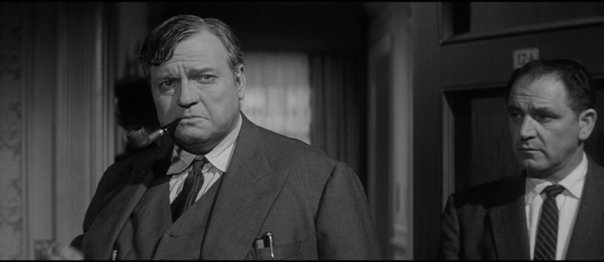 for the moral faculties on issues of captial punishment.
for the moral faculties on issues of captial punishment.
>> Real Life: James wound up in jail after killing someone while drinking and driving. He lost everything before things turned around for him.
>> More to see: looking for more out of life?
See the Clarence Darrow summation scene by Orson Welles in "Compulsion" (1959)
Apollo 13 (1995)
“Apollo 13” (19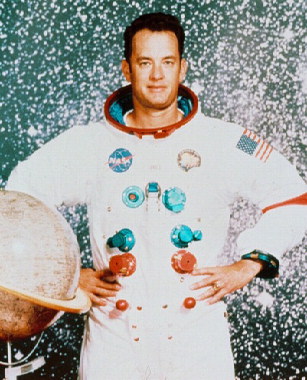 95), directed by Ron Howard, provides a wonderfully realistic dramatization of the historic aborted moon voyage of 1970. There was a PG rating on the film for language and emotional intensity. I appreciated the warning as the parent of a 10 year old who remains fascinated by gadgets, gizmos and galaxies but who
95), directed by Ron Howard, provides a wonderfully realistic dramatization of the historic aborted moon voyage of 1970. There was a PG rating on the film for language and emotional intensity. I appreciated the warning as the parent of a 10 year old who remains fascinated by gadgets, gizmos and galaxies but who 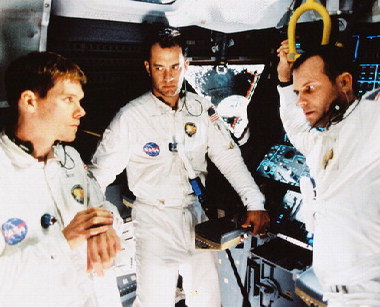 gets slightly stressed out by the super suspenseful inner states of being that sell movies. You really do want to make sure that you go to the bathroom before you start out on this two hour “disasterful” cinematic voyage to the moon and back. Tom Hanks, Bill Paxton and Kevin Bacon (playing astronauts Lovell, Haise and Swigert) form a triumvirate for outer space. Ed Harris provides ground support as Flight Director Gene Kranz. Well, there was that other guy, Gary Sinise. He plays astronaut Ken Mattingly. That’s the fellow who gets knocked off of the roster at the last minute by
gets slightly stressed out by the super suspenseful inner states of being that sell movies. You really do want to make sure that you go to the bathroom before you start out on this two hour “disasterful” cinematic voyage to the moon and back. Tom Hanks, Bill Paxton and Kevin Bacon (playing astronauts Lovell, Haise and Swigert) form a triumvirate for outer space. Ed Harris provides ground support as Flight Director Gene Kranz. Well, there was that other guy, Gary Sinise. He plays astronaut Ken Mattingly. That’s the fellow who gets knocked off of the roster at the last minute by 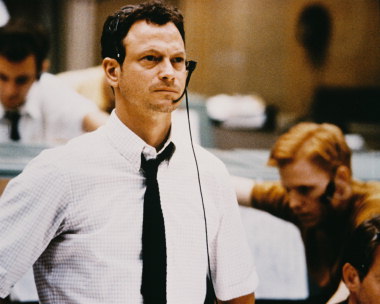 German measles - but no one ever mentions him. They did manage, in the name of historical accuracy, to mention the fact that the unfortunate Pilot Haise, played by Bill Paxton, got a major urinary tract infection due to not drinking enough water during the mission. Too much information.
German measles - but no one ever mentions him. They did manage, in the name of historical accuracy, to mention the fact that the unfortunate Pilot Haise, played by Bill Paxton, got a major urinary tract infection due to not drinking enough water during the mission. Too much information.
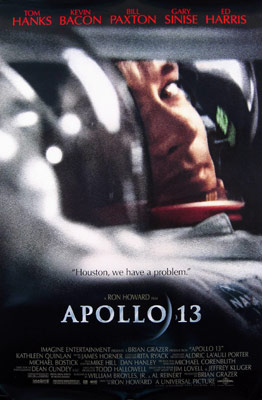 Methinks there was a bit too much testosterone floating around the stratosphere in this film. In the end, everyone keeps their head and all get back to earth safely. I really wasn’t sure there for a few minutes – and that was after seeing the film previously and living through the historical event. When they are done right, movies can be an engrossing form of storytelling. This one was done right.
Methinks there was a bit too much testosterone floating around the stratosphere in this film. In the end, everyone keeps their head and all get back to earth safely. I really wasn’t sure there for a few minutes – and that was after seeing the film previously and living through the historical event. When they are done right, movies can be an engrossing form of storytelling. This one was done right.
>>More to see: Looking for more out of life?
>>Real Life Story: Darrell Waltrip was a great success as a NASCAR driver until a near fatal accident changed his direction in life.
View the video trailer for "Apollo 13" (1995)
Starting Out in the Evening (2007)
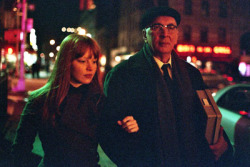 “Starting Out in the Evening” (2007) is actually a film about more than just writers and the craft of writing. It’s about family, career, ambition, following one’s passions, facing death and disappointments . . . and probably a few other things along the way.
“Starting Out in the Evening” (2007) is actually a film about more than just writers and the craft of writing. It’s about family, career, ambition, following one’s passions, facing death and disappointments . . . and probably a few other things along the way.
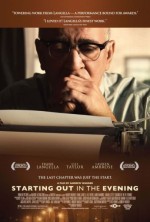 Some may find the film a bit slow and obsessively internally focused. What else can one expect? After all, it’s about the world and the process of being a writer, for goodness sake. (Well, actually, we’re not really too sure for whose sake any of this writing stuff is really for in the end. It seems to me that the film desperately wants to convince us that art for art’s sake is its own reason for being.)
Some may find the film a bit slow and obsessively internally focused. What else can one expect? After all, it’s about the world and the process of being a writer, for goodness sake. (Well, actually, we’re not really too sure for whose sake any of this writing stuff is really for in the end. It seems to me that the film desperately wants to convince us that art for art’s sake is its own reason for being.)
Leonard Schiller has lived the life of a New York intellectual. He now has lots of time to reflect on whether it has all been worth it as he faces the illness and incapacity of old age. He’s been stuck with a bad case of writer’s block for years now. It is high time to face up to the truth: neither he nor the characters of his latest novel are going anywhere. A bright young grad student (Lauren Ambrose) intent on 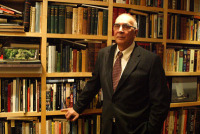 building her own career helps Schiller to realize that he has been following his characters around for years in vain, “waiting for them to do something interesting”. Schiller is faced in the end with a moral dilemma that cuts to the core of his artistic and personal integrity. Does he have the courage to face life the way it really is with its disappointments and limitations and still engage fully in the creative process? Will he do it this time in a wiser, less self-centred way?
building her own career helps Schiller to realize that he has been following his characters around for years in vain, “waiting for them to do something interesting”. Schiller is faced in the end with a moral dilemma that cuts to the core of his artistic and personal integrity. Does he have the courage to face life the way it really is with its disappointments and limitations and still engage fully in the creative process? Will he do it this time in a wiser, less self-centred way?
Schiller’s daughter, Ariel, has a different dilemma. Her life as a former dancer is anchored in a much more physical day-to-day reality, in  contrast to her father’s intellectual pursuits. Ariel has to face her own moral dilemmas and internal wrestlings as she processes what it means to her to be pushing 40 and still be childless. Conflicted desires and yearning for fulfillment bubble up as she faces the mandatory “early retirement” of her dancing career and encounters a former lover who has other priorities in life. (See the video clip.)
contrast to her father’s intellectual pursuits. Ariel has to face her own moral dilemmas and internal wrestlings as she processes what it means to her to be pushing 40 and still be childless. Conflicted desires and yearning for fulfillment bubble up as she faces the mandatory “early retirement” of her dancing career and encounters a former lover who has other priorities in life. (See the video clip.)
Not the film to see if you’re in the mood for an adrenalin rush or up for mindless movie-watching with lots of microwave popcorn on hand . . . It certainly does have its merits though. If you’re not in a rush, why not spend a couple of hours mulling things over with this engaging piece of cinema.
>>More to see: Looking for more out of life?
>>Real Life Story: Successful author, Anne Rice, tells of how the exploration of her personal demons led to writing a series of vampire novels before taking a surprising twist later on in her professional life.
Understand more about "The Written Life" as depicted in SNAM's Interviews about two films which take on the subject of authors and the work of the author. The films described in the Interviews are "Starting Out in the Evening" (2007) and "Infamous" (2006).
See the trailer for "Starting Out in the Evening" (2007)
Dominick and Eugene (1988)
 “Dominick and Eugene” (1988) has Tom Hulce and Ray Liotta play the parts of twin brothers, one of whom is slightly mentally retarded while the other studies to be a doctor. Hulce plays the slow witted brother. He exchanges comic books with an 11 year old boy on his garbage pick up route, loves pretending he is the Incredible Hulk and has problems remembering his responsibility to walk the dog. The brother played by Ray Liotta is saddled with some of the “adult” concerns of life; trying to plan his medical career, making progress in his love life and keeping his somewhat naïf brother out of trouble with drug dealers, hookers and neighbourhood thugs. Jamie Lee Curtis, the love interest for Gino, finds out that she really doesn’t know what she’s getting into by
“Dominick and Eugene” (1988) has Tom Hulce and Ray Liotta play the parts of twin brothers, one of whom is slightly mentally retarded while the other studies to be a doctor. Hulce plays the slow witted brother. He exchanges comic books with an 11 year old boy on his garbage pick up route, loves pretending he is the Incredible Hulk and has problems remembering his responsibility to walk the dog. The brother played by Ray Liotta is saddled with some of the “adult” concerns of life; trying to plan his medical career, making progress in his love life and keeping his somewhat naïf brother out of trouble with drug dealers, hookers and neighbourhood thugs. Jamie Lee Curtis, the love interest for Gino, finds out that she really doesn’t know what she’s getting into by  getting involved with her fellow medical student. She’s caught in the middle.
getting involved with her fellow medical student. She’s caught in the middle.
There’s a bit to work out in the space of two hours. Some startling revelations relating to manslaughter, child abuse and kidnapping could be interpreted by the exceedingly cynical film critic to be contrived and overly predictable vehicles for sentimentality. I prefer to see the events and the characters as true to life. It may be hard for some to believe,  but people like this and situations like this really do exist. I for one have met up with some of them. The interpretation of the movie may rest more with the inner state of mind of the reviewer than the actual skill of the actors, directors and writers involved in the movie making with this film. It’s a film that could go either way. I personally put a full three hankie warning on the film (with lots of nose blowing and tear wiping anticipated for anyone who is the least bit emotionally engaged).
but people like this and situations like this really do exist. I for one have met up with some of them. The interpretation of the movie may rest more with the inner state of mind of the reviewer than the actual skill of the actors, directors and writers involved in the movie making with this film. It’s a film that could go either way. I personally put a full three hankie warning on the film (with lots of nose blowing and tear wiping anticipated for anyone who is the least bit emotionally engaged).
>>More to see: Looking for more out of life?
>>Real Life Story: Jimmy’s working class parents weren’t prepared that day when they sent their teenage son to the corner store. What happens in the families of an innocent victim touched by gang violence?
See a video clip from "Dominick and Eugene" (1988)
Georgy Girl (1966)
Before there was an “Ugly Betty”, there was “Georgy Girl” (1966). The film lights down in London town during those mad 1960s with the crazy new sounds coming out of bands like “The Seekers” and the even crazier new hairdos and mini skirts. We see Georgy girl (Lynn Redgrave) awkwardly sporting one of the new “dos” as the opening credits roll over top of the chart topping 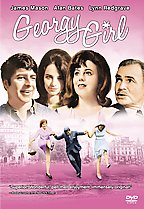 number by the Australian band. (I was surprised to learn that they weren’t a part of the British invasion.) The film is a lot like the title song in that it is a lighthearted romp with surprisingly serious undertones for those who are really listening.
number by the Australian band. (I was surprised to learn that they weren’t a part of the British invasion.) The film is a lot like the title song in that it is a lighthearted romp with surprisingly serious undertones for those who are really listening.
The story line is a bit mixed up, much like Georgy herself. Georgy’s beautiful and free-spirited roommate, Meredith, leaves behind a boyfried and a baby as she gets on with her life after an ever so brief encounter with her own non-maternal nature. Georgy tries to pick up the pieces. After all, there is an adorable, helpless child involved. The make-shift domestic arrangements with Jos, the baby’s father, soon fall apart. A cast-off boyfriend doesn’t really fit any 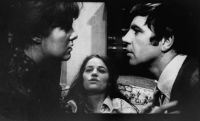 better than the ridiculous coiffure that Georgy tries on in the film’s introduction. In true improvisational style that fits the times and Georgy’s quirky personality, she tries on a completely different set of circumstances by accepting her family’s employer as stand-in dad. James Leamington (played by James Mason). James Leamington is supposedly Georgy’s better in social standing - although one wonders if he isn’t actually her “worser” after he offers her an albeit “very proper” and attractive contractual arrangement for Georgy to be his mistress. Georgy passes up the offer. She’d like to think she can do better. She changes her mind (like a girl changes clothes) when the offer firms up a bit more and becomes a proposal of marriage after Leamington’s wife conveniently takes herself out of the way by dying.
better than the ridiculous coiffure that Georgy tries on in the film’s introduction. In true improvisational style that fits the times and Georgy’s quirky personality, she tries on a completely different set of circumstances by accepting her family’s employer as stand-in dad. James Leamington (played by James Mason). James Leamington is supposedly Georgy’s better in social standing - although one wonders if he isn’t actually her “worser” after he offers her an albeit “very proper” and attractive contractual arrangement for Georgy to be his mistress. Georgy passes up the offer. She’d like to think she can do better. She changes her mind (like a girl changes clothes) when the offer firms up a bit more and becomes a proposal of marriage after Leamington’s wife conveniently takes herself out of the way by dying.
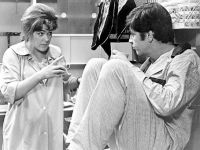 In the end, it is a marriage of convenience that Georgy chooses as her best fit in the era of the sexual revolution. It is perhaps the best option afforded to someone like Georgy “who just missed being beautiful”. One wonders how well this arrangement is going to work out over time, as we watch the closing scene where the new bride repeatedly caresses her adopted infant. She seems oblivious to the groom sitting next to her in the get away car. It may well end up as just another failed experiment to be washed away down the drain along with the hair pins and mascara of Georgy’s “new look” in the opening scene.
In the end, it is a marriage of convenience that Georgy chooses as her best fit in the era of the sexual revolution. It is perhaps the best option afforded to someone like Georgy “who just missed being beautiful”. One wonders how well this arrangement is going to work out over time, as we watch the closing scene where the new bride repeatedly caresses her adopted infant. She seems oblivious to the groom sitting next to her in the get away car. It may well end up as just another failed experiment to be washed away down the drain along with the hair pins and mascara of Georgy’s “new look” in the opening scene.
Georgy’s pick of the best offer out of a limited range of options appears to be missing something: unconditional commitment and acceptance of people for who they really are. It’s what Georgy really wants; it’s what all of us want in the end –free love.
Don’t miss the SNAM Interviews on the subject of “Beauty -and Other Myths”. The Interviews deal extensively with another movie with a parallel theme shown in conjunction with “Georgy Girl” The second feature was “Dogfight”.
>>Real Life: Michelle participated in “The Biggest Loser” contest in order to lose weight. She found unexpected healing that led to a more permanent change in her life.
>>More to see: Looking for more out of life?
See the TVO video trailer for "Georgy Girl" (1966)




